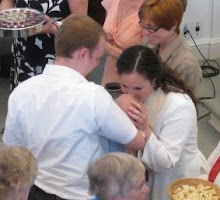Recently, I signed the United Church of Christ's petition, "100,000 for Peace" which calls on the US government to end the war in Iraq. Today, I listened to a short interview on NPR with Ayub Nuri, an Iraqi freelance journalist who lives and works in the United States but is frequently in contact with family, friends, and citizens in Iraq. In the 4 minute interview, Mr. Nuri discusses his impression of the status of Iraq based on his conversations with Iraq citizens in comparison to the President's report given to the nation on September 13, 2007. While the President highlights that “ordinary life is beginning to return” for Iraqi civilians, Mr. Nuri asserts that most Iraqi’s feel that they cannot leave their homes and neighborhoods and that their country is still sharply divided along sectarian lines.
I have absolutely no doubt in my mind that our reasons for entering Iraq were based on greed; hunger for pure hegemony. And now that we have violated their country and failed at our stated mission- we are seemingly left with two options: to stay or to leave. I believe that this issue, like so many others, is not black and white- rather it is nuanced and can be seen in various shades of gray. For me, it is clear that we must withdrawal militarily. We must, as the UCC declaration states, "acknowledge failure and error, to accept the futility of our current path...". However, a withdrawal militarily must be united with massive humanitarian relief. God calls us to be in right relationship with each other, to honor and uplift each other- and when we, as a country, are the cause of so much suffering, there can be no greater violation of our covenant with God than to abandon “the least of these.” I believe that we should stay in Iraq not because of the victory that President Bush believes is possible, but because we must atone for the humanitarian atrocities that we have committed.
The “100,000 for Peace” petition states that I am signing to "support the ministries of compassion for victims here and in the Middle East" and that I am rededicating "myself as a child of a loving God who gives "light to those who sit in darkness and the shadow of death, to guide our feet into a way of peace"." I believe that my signature on the petition is also an outward symbol of my belief that we need to atone for our sins against our sisters and brothers in Iraq.
Do I want the troops out of Iraq? I think so. Do I think we, as a nation should leave Iraq? I think not. This upcoming week, Yom Kippur is being celebrated in the Jewish tradition. Yom Kippur is the day of atonement, a day to confess all the sins that you have committed, knowing that nothing can separate you from God. There is one sin that the day of atonement cannot forgive, and those are sins against other people. Instead, Yom Kippur and the Jewish tradition states that you must first go to the person that you have sinned against and confess what you have done and then ask for their forgiveness. It is only after this reconciliation that you can approach God for atonement. As the day of atonement approaches, we, as a nation, have considerable atoning to do with our brothers and sisters in Iraq. I believe that part of that atonement is of course, the recognition of our wrongdoing, but also the unique and sincere effort to change the course of our sins. Our new relationship must listen to the voices of the Iraqi people and our arrogance as a country must come to an end. Only then can we begin the path of forgiveness and reconciliation.

1 comment:
Indeed, nothing we do can erase the harm caused by the invasion. But we can, and must, ease the suffering to the best of our ability. That's the humanitarian aid part.
I know it's difficult to admit guilt. There is fear that it is a sign of weakness. Yet overcoming fear is a sign of strength, and admission of a mistake is a sign of growing wisdom.
Some fear that an admission of guilt is an invitation to retaliation. Yet those who feel they have not yet experienced justice are far more likely to retaliate.
Restorative justice - searching for solutions that restore victim, offender, and community - works on a local scale, and I believe it can work on a global scale.
It is time that the United States of America, a 231-year-old nation, becomes a mature example of responsibility and grace.
Post a Comment